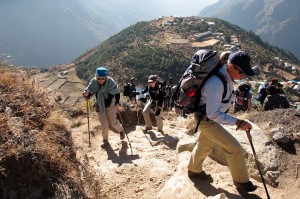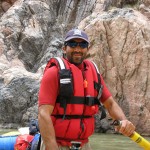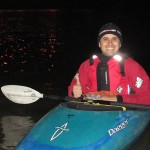
Far and wide, region to region, the current global economic uncertainty and possible further widespread disruption of regional economies, shifting exchange rates and wary consumers resounded as the major potential threat on the horizon to ATTA tour operator members. Here were some other challenges and concerns:
 Kate Reid Director, Call of the Wild Inc.
Kate Reid Director, Call of the Wild Inc.
Call of the Wild's biggest challenge remains breaking through the nearly infinite choices on the World Wide Web for adventure travel. The Internet has in some ways paralyzed the client with so many potential choices. It can be really hard to differentiate yourself in the marketplace – and we are even an all women travel company! We are very fortunate to have a 55% repeat client ratio. It can be a tough sell to convince a woman in her 60's to come join us for a week where showers might be hard to come by and you might be carrying a backpack for 7 days straight. Once she travels with us though, she is hooked.
 Pepe Lopez - Manager at Apumayo Expediciones Peru
Pepe Lopez - Manager at Apumayo Expediciones Peru
To compete with large corporations that open branches in our countries. They cut trip prices because they have [lots of] volume, they don't use local outfitters and they take advantage of not paying taxes. They employ people mostly full time but wages and work conditions are not [good]. There are agreements where they pay less but the authorities document full payment.
 Rob Rankin - Managing Director of Vagabond Adventure Tours of Ireland
Rob Rankin - Managing Director of Vagabond Adventure Tours of Ireland
On a local level, increased competition is a big one. With the economic downturn here a lot of people have made lifestyle choices, often after being made redundant from their jobs, and set up their own business. And it seems a popular one is to start a tour operation. And we wish them well, but it does mean more operators in the market. We just need to make sure we keep evolving and remain one step ahead.
We also need to make sure that we can keep competitive in a world market, a weaker Euro is helping with that. Also leprechauns are in very short supply now (word got out that they taste like chicken) so we can't be sure to spot one on every tour.
 Christian Wolters - Director, Sales and Marketing at Intrepid Travel Americas
Christian Wolters - Director, Sales and Marketing at Intrepid Travel Americas
Rising fuel charges, increased cost-cutting by competition and natural/political incidents that disrupt travel.
 Michael Mettler - Managing Director of Baumeler Travel Ltd.
Michael Mettler - Managing Director of Baumeler Travel Ltd.
Finding the needle-in-a-haystack with a small marketing budget!
 Ben Bressler - Founder & Director, Natural Habitat Adventures
Ben Bressler - Founder & Director, Natural Habitat Adventures
For us, poor exchange rate can really hurt. We can only charge so much but when the U.S. dollar is comparatively weak against, say, the Canadian dollar it can really hurt profits.
 Angelina Fourkioti- Incoming Sales Manager, Trekking Hellas Group of Companies
Angelina Fourkioti- Incoming Sales Manager, Trekking Hellas Group of Companies
Negative media due to the political / economic situation in Greece. We are doing everything within our powers to be competitive, deliver the best quality and be innovative enough to keep up with the emerging trends. Yet people are always affected by media and negative comments about a country heard over the news. This is something beyond our control and one of our biggest threats.
 Omar Samra - Founder & Chief Guanabana, Wild Guanabana
Omar Samra - Founder & Chief Guanabana, Wild Guanabana
In our part of the world we had an especially challenging 2011 due to the Arab Spring phenomena which diluted people's interest to travel and made it harder for them financially.
 Jorge Pérez Tierra del Volcan
Jorge Pérez Tierra del Volcan
Climate change is a big challenge for adventure tourism, because now weather has become less predictable. Also, we sell experiences or intangible products; so perceptions play a big role. It's a big challenge to meet different clients' needs and expectations, so you have to learn to be flexible. Create the right communication channels with the clients to talk about their experience, and to tell you if there was something they didn't like - before they tell everybody through the social media.
 Sonja Gottlebe-Ranarivelo - Manager / Owner Boogie Pilgrim
Sonja Gottlebe-Ranarivelo - Manager / Owner Boogie Pilgrim
We live and invest in a permanently unstable country that has lots of political problems. Any event is over-exaggerated by foreign media and has an immediate negative impact on tourism (travel alerts, etc). We do also face some environmental problems due to extreme poverty and lack of education: huge bush-fires sometimes destroy National Parks, rosewood logging for Chinese export, illegal mining activities in touristic areas…
 Bruno Toutain of Cyclomundo
Bruno Toutain of Cyclomundo
Airfares, and more intense competition from a bigger field.
 Douglas Simões – Pure Brasil Director
Douglas Simões – Pure Brasil Director
Internet competition and rising prices in Brazil
 Debbie Hendricks, Co-Owner, Just Roughin' It
Debbie Hendricks, Co-Owner, Just Roughin' ItThis doesn't probably apply to most adventure travel companies, but for us it is increased regulations in governmental agencies and environmental impact assessments.

Tiger Li, Founder, Diverse China
The biggest challenge/threat would be the preparation for local operators to work with Chinese clients. Some essential preparation, for instance:
- Chinese-speaking team, like office operators and guides. I have found out that it is not easy for some destinations to find a Chinese speaking guide, and many they find are not professional guides. So, we need to send out Chinese tour leaders with every team and that is very expensive.
- The instructions in vehicles, hotels, scenic sites need to be in Chinese
- Chinese meals (including breakfast in the hotel). Chinese tourists like to try different authentic local food as well. But a few Chinese meals options are great since Chinese people are really picky about food.
- Chinese-speaking call operators in hotels - That is difficult. Very few hotels out of China (besides southeast Asia) have Chinese-speaking staff.
 Mandip Singh Soin FRGS, Founder & Managing Director of Ibex Expeditions Private Limited
Mandip Singh Soin FRGS, Founder & Managing Director of Ibex Expeditions Private Limited
The biggest challenge is for us to convince the FTO's around the world that there is a diversity of experience in the Indian Himalaya, as each region is so culturally diverse to the other and that it can be a whole-year operation. But as tourism increases, if we don't put in practical sustainable strategies and policies, we will have more trouble in the wilderness areas as there could be pressure for resources.
 Nicole Robinson - Commercial Director at &Beyond
Nicole Robinson - Commercial Director at &Beyond
Safety issues caused by political uncertainties, terrorist/pirate activity, natural disasters and the misunderstanding of the extreme distances between one location and another safe, tourist area. Uncontrollable factors have the potential to make a destination a "no-go" zone and impact those around it that are unaffected.
 Elín Sigurveig Sigurðardóttir - General Manager at Icelandic Mountain Guides
Elín Sigurveig Sigurðardóttir - General Manager at Icelandic Mountain Guides
For us here in Iceland, nature is a big challenge, we never know when the next volcanic eruption will take place. But on a more global note, the economic stability in Europe, our closest market, is crucial.
 Marie-Pier Mercier - Marketing Coordinator at Quebec Maritime
Marie-Pier Mercier - Marketing Coordinator at Quebec Maritime
As a destination, we are always at the mercy of the economic and political climate of our target markets. Furthermore, we must never forget that our destination is competing worldwide for visitor dollars and that it has never been easier for travellers to access information and visit the remotest of countries. The tourism industry is constantly in flux: markets that may seem to be of no interest at the moment could become very important in the near future.
 Norman Howe - President of Butterfield & Robinson
Norman Howe - President of Butterfield & Robinson
The accessibility of information on the Internet has created a new kind of transparency in local information and pricing – making local contacts and on-the-ground research more important than ever.
 Steve Markle - Director of Sales & Marketing at O.A.R.S.
Steve Markle - Director of Sales & Marketing at O.A.R.S.
Our biggest challenge at OARS is breaking through inherent barriers to participation like camping and rafting. Sounds crazy right? Rafting and camping are what we do…However, we know that once people experience an OARS trip, they're converted for life, but getting them to consider an overnight rafting trip in the first place is the biggest challenge we face. The biggest potential threat we face is the ongoing prospect of drought in the Western U.S. and continued economic instability.
